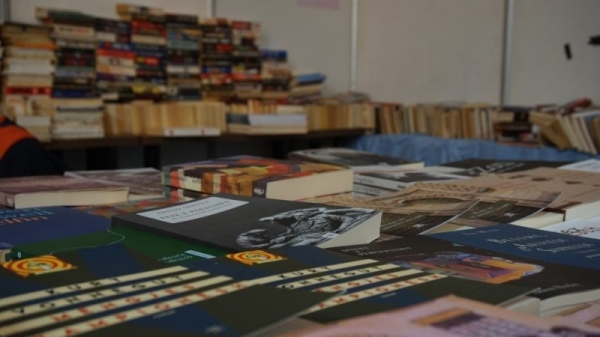Ethnic Albanians in Serbia to receive literature donated by Albanian municipalities

Some 200 books in the Albanian language have been collected by local residents in the city of Pogradec in Albania, to send to ethnic Albanians living in Serbia who have expressed difficulties in accessing such literature in local libraries and schools.
During his last visit to Pogradec, the Nagip Arifi, mayor of Bujanovic, an ethnic Albanian majority region, explained that his constituents were “suffering” from a lack of access to Albanian literature. As a response, the Deputy Mayor of Pogradec, Entela Gusho announced that over 200 books had been collected and would be distributed.
“This idea started at the end of March, when all the mayors of the municipalities of Macedonia, Kosovo, but also the Serbian Albanian municipalities were in Pogradec. The mayor of the municipality of Bujanovc expressed with pain that the library of this city has a shortage of Albanian books and authors, and the residents of this municipality are looking for these books,” said Gusho.
Many of the donated books came from young people and students.
“I heard about the call that the municipality of Pogradec made regarding the donation of books for the library of Bujanovac in the valley of Presevo, my relationship with the book is sacred, and I was inspired to participate in this initiative…I think that the book is the strongest weapon to connect people, especially our compatriots”, student Fjona Danglli told Euronews.
Another donor, Loridela Beqari said, “I decided to donate a book and many others that I have at home because I became part of this initiative, in terms of enriching the library of Bujanovac. The passion I have for books and knowing that other people do not have the same opportunity that we have to read Albanian, I will donate a part of my books.”
In 2020, the Albanian government donated Albanian language books to students in the same region to help with their studies. Some 4,052 students benefited from the programme, which cost some €140,000.
Ethnic Albanians living in the Presevo Valley of Serbia not only struggle to gain access to books in Albanian in local libraries and schools, but they are experiencing illegal removal from the civil registry.
In 2022, EURACTIV reported that some 6,000 ethnic Albanians had been wiped from the registry and voter lists, meaning they could not vote, buy property, access the health system, or enrol students in schools.
According to years of research by an academic and former resident of the area, Flora Ferati Sachsenmaier, ethnic Albanians have been systematically erased from official state registers.
“In 2015, I was researching in the area, and some of the families, activists and politicians I came across kept saying, ‘they are deleting us, they are deleting us’. This got into my mind, and it always came in conjunction with the Ministry of the Interior in Serbia,” Sachsenmaier told Exit, EURACTIV’s media partner, which was the first to sound the alarm over the situation.
Data collected and processed by Sachsenmaier, based on historical voter lists, suggests that 4,200 in the municipality of Medvedja have been removed, and a further 2,000 in Bujanovac report being de-registered.
Further data collated by Sachsenmaier suggests that some villages of Medvedja have seen a decrease in the Albanian population of between 41-71%, even though they never left the area. For example, the village of Sfrice has seen the number of ethnic Albanian voters decrease by 71.25% between 2012 and 2019. In Sijarine, it is 70.64%.
According to Sachsenmeir’s research and the collected testimonies of residents, the authorities, under cover of the residence law, claimed to be sending people to verify residences.
These envoys would report that the residents could not be found at their address and a notification would be sent to the Electoral Commission. Entire families are then wiped off the electoral lists. With no written decisions issued, there is no route for appeal.
She continued that citizens reported being told “No, you don’t live here, you live in Kosovo, we cannot recognise you,” and that this answer was being given predominantly to Albanians.
“It is important to understand that they are abusing the law. Every country in the world has a residency law, but there is no country in Europe that abuses the law of residence to target a specific group to change the ethnic composition,” she added.
The alleged practice was dubbed “ethnic cleansing by administrative means” by the Helsinki Committee in Belgrade.
At the time, the European Commission told EURACTIV it was aware of the reports of the mass erasure of ethnic Albanians from official databases.
“We are monitoring the situation in light of the commitments taken in the framework of the accession negotiations, particularly those related to the rights of persons belonging to national minorities,” a Commission spokesperson said.
(Alice Taylor | Exit.al)



